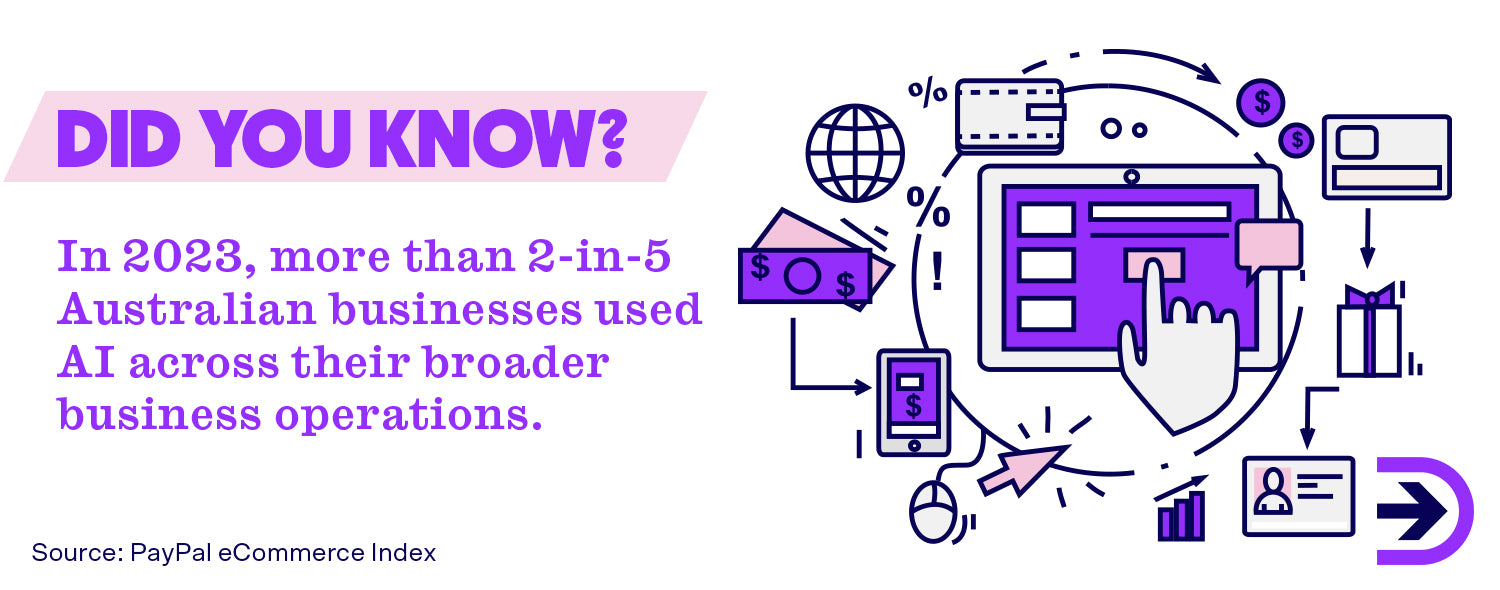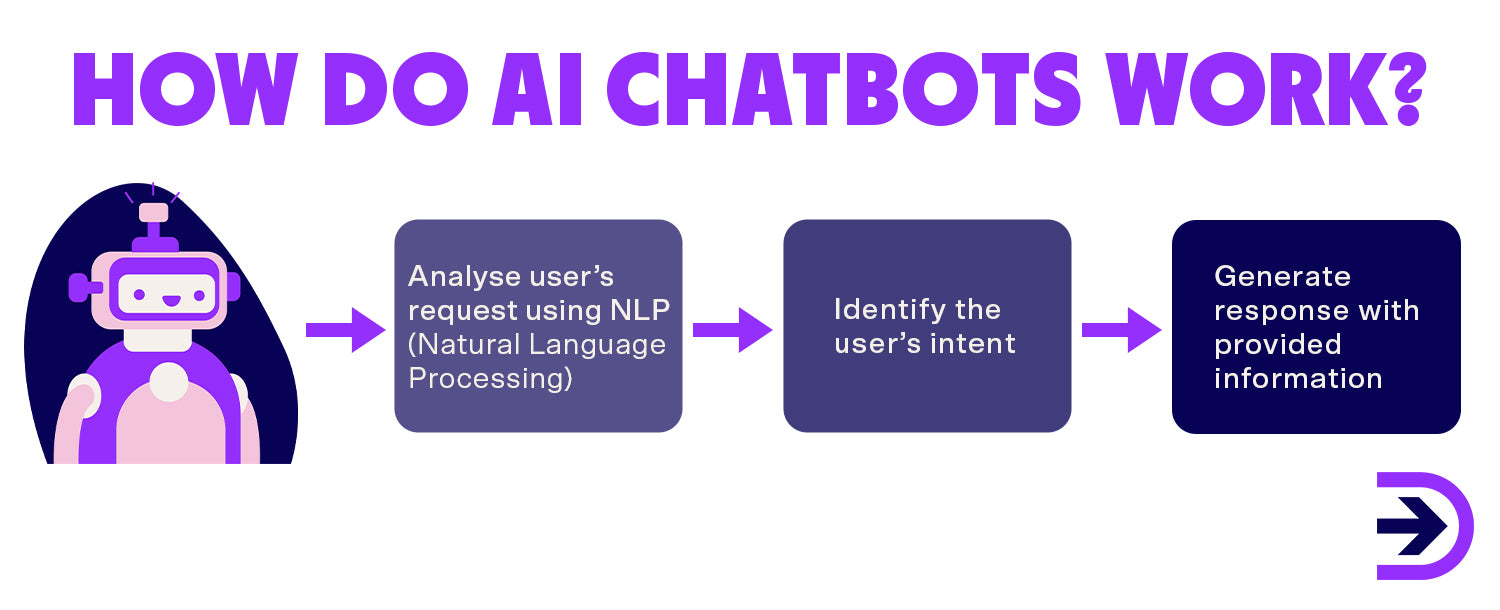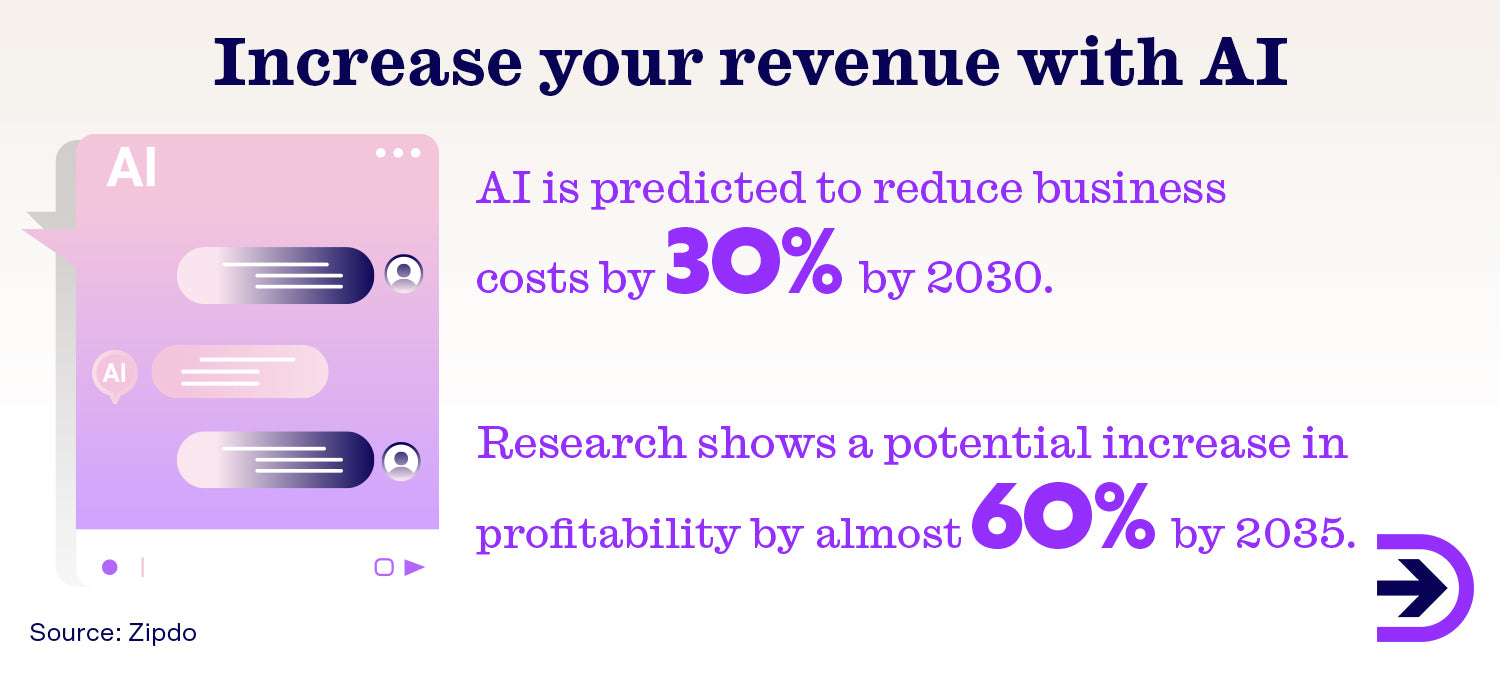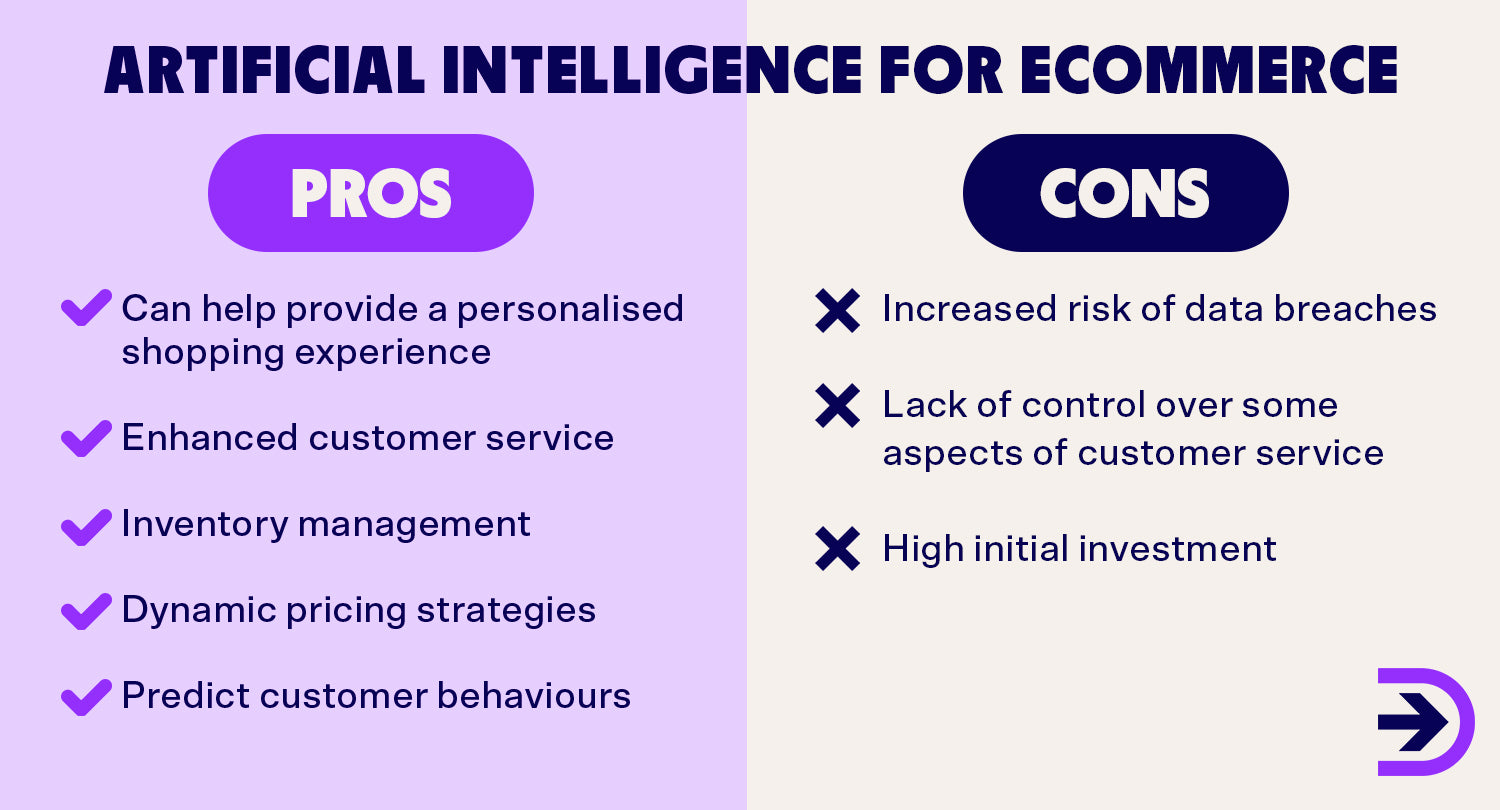
How AI in Ecommerce is Evolving and What to Expect in 2024
As we approach the year 2024, it's becoming increasingly evident that artificial intelligence (AI) will play a crucial role in ecommerce and online shopping. From chatbots and virtual shopping assistants to tailored algorithms, businesses that fail to utilise AI risk falling behind their competitors.
AI in ecommerce is here to stay
AI is revolutionising ecommerce by delivering personalised customer experiences, enhancing customer support, and showcasing products uniquely tailored for each customer. In the early days of ecommerce, personalisation was quite limited. Customers would place orders online, and very little information was saved about them. Retailers relied solely on browsing history to personalise the shopping experience. However, with the internet gaining more users, the amount of data generated increased, and online stores had to use AI technology to analyse data and personalise the shopping experience for each customer. AI algorithms were developed by identifying customer shopping patterns and preferences, and in 2023, more than 2-in-5 Australian businesses used AI across their broader business operations. In 2024, even more business owners will join this percentage as AI paves the way for the future of ecommerce.

AI is revolutionising the way online businesses operate by maximising revenue and improving conversion rates. As the capabilities of AI continue to improve, it will undoubtedly remain a powerful tool for businesses in 2024 and onwards. In addition, AI is making business operations simpler by automating tasks that were once done manually. This not only saves valuable time and money but also makes life easier for business owners. Like most technological advancements, AI is here to stay and will continue to be developed over the coming years, bringing further improvements and benefits to businesses and their customers alike.
Advances in AI for ecommerce in 2024
To help you understand why AI in ecommerce is here to stay, we’ve outlined some of the top advancements to show you how AI can help your business in 2024.
List of advances
Personalised product recommendations
This technology employs natural language processing (NLP) and machine learning to analyse customer shopping behaviour and purchase history, offering customers a personalised shopping experience. AI features incorporated on ecommerce websites suggest products that customers are more likely to be interested in based on their shopping history to help them find what they are looking for. Retail businesses that use AI to implement personalised strategies are likely to see a six to ten per cent increase in revenue and at a rate that is two to three times faster than other retailers.
Online customers greatly value a personalised shopping experience, just like how you would appreciate your local café remembering your coffee order. By utilising AI in personalising the shopping experience, you can enhance customer satisfaction and reduce cart abandonment rates by improving their engagement on your website. With AI, customers will be more confident in their purchases as the algorithm will take into account their past purchases, thus leading to a more efficient sales process and helping convert more potential customers into sales. Instead of aimlessly scrolling through your website, customers will be presented with items that are tailored to their preferences and needs, making the shopping experience more efficient and enjoyable.
AI-powered personalisation goes beyond just a website. It can now be extended to all sales channels, including social media. With AI, your customers' shopping preferences can be remembered across all channels. Additionally, AI can assist in upselling during the final stages of the customer journey by suggesting products that the customer may be interested in at checkout.
Chatbots and virtual assistants
It’s estimated that 80 per cent of all customer interactions were handled by AI in 2023, and this number will only continue to grow as the technology develops further in 2024. Utilising AI to aid customers is an effective method to enhance your conversion rate while delivering a positive online shopping experience. Chatbots are extremely popular, and by 2030 the market for chatbots is expected to reach AUD $5.9 billion. Chatbots and virtual assistants can address customers’ questions about products, saving retailers valuable time as they do not have to manually respond to simple inquiries. By 2024, employing chatbots and virtual assistants on your website will become an expectation of customers. This will not only assist your online store in appearing more professional and trustworthy, but it will also improve your chances of success.

Chatbots and virtual assistants are not only there to make customers' lives easier but also to streamline the checkout process. By answering any questions customers have in real-time, such as product sizing, chatbots can improve website usability by storing this data. Unlike submitting a customer query through an email or customer service form, chatbots allow customers to stay on the website, increasing the likelihood of making a sale. In addition, AI-powered chatbots are available 24/7 and can help reduce overall business costs by eliminating the need to hire and pay a customer service team. Online retailers who leverage this AI capability in 2024 will significantly reduce the time spent dealing with customer service inquiries and have more time and money to focus on other parts of the business, such as marketing campaigns and website development.
Cyber security
The number of website hacks increased significantly in 2023 from the previous year, and it's expected to rise even more in 2024. AI can be extremely helpful in detecting and preventing fraudulent transactions in real time, ensuring the safety of your website and customer data. By analysing unusual transaction amounts, multiple sales in a short period, and unfamiliar locations, AI can identify and investigate such activities further. AI can also assess customer transactions and behaviour and compare them with fraudulent ones to help stop cyber-attacks. This saves time by automating the detection of fraudulent activity and alerting your IT team or rerouting the hacker to a different server. Some online businesses even reported that they saved an average of $375,000 annually by flagging things like suspicious returns. AI is also useful in completing tedious tasks to do with website security, which otherwise would have been done manually. However, it's not recommended to rely solely on AI for website security, as some tasks require human intervention to ensure data safety. Combining AI capabilities with human expertise will result in the most efficient cybersecurity.
Inventory management
However, it is crucial to avoid inventory risks such as seasonality and overstocking. With AI, demand forecasting can be done quickly and accurately by analysing massive amounts of data. By using historical data, AI can automate inventory management and predict sales demand. For instance, if a product sells more during a particular time of the year, AI will help determine when to start ordering more and how much to order. Moreover, AI can provide insights into which products are selling well in real time. With real-time inventory tracking, businesses can avoid errors and keep track of stock levels, helping to increase inventory efficiency and profitability for businesses.
Dynamic pricing
Having a dynamic pricing strategy is one of the most crucial ways to stay ahead of your competition and attract more customers. Dynamic pricing involves changing the price of your products based on market trends and customer reactions. Typically, this involves extensive manual market research, and even then, the market trends may change frequently, requiring constant monitoring. However, with AI, you can automatically predict changes in market trends and customer behaviour, which can help you adjust your pricing strategy accordingly. If you sell your products across multiple marketplaces that have different pricing strategies, AI can automatically set the prices for you and apply discounts to increase your sales traffic and optimise your revenue.
Implementing a dynamic pricing strategy can benefit your ecommerce business in two ways - increasing sales and improving inventory management. By constantly adjusting prices based on demand and competition, the strategy attracts customers looking for the best deals, leading to efficient inventory management. The increased sales also make your business more scalable, while AI algorithms do most of the hard work for you. This approach ensures that customers remain loyal, as they keep finding the right prices at the right time, across multiple platforms.
Customer churn prediction and prevention
Losing customers is an inevitable challenge that every business has to face, and this is also known as customer churn. However, if you are unable to prevent this loss or predict the reasons behind it, it can lead to greater revenue losses. Fortunately, AI has the potential to help in this regard. By analysing the trends in data, AI can help identify patterns that may indicate why customers are leaving, which can then be used to develop strategies to reduce customer churn.
AI technology can provide you with valuable insights into why customers abandon their carts or leave your website without making a purchase. By using AI-powered tools, you can gain a better understanding of customer behaviour and identify the reasons behind these issues. Once you have this information, you can take steps to improve customer retention by setting up risk management incentives like email welcome journeys or offering loyalty programs and discounts to encourage customers to complete the checkout process. Understanding your customers is critical to the success of your business, as your sales depend on them. Without loyal customers, your business may struggle, and that's where AI can help you.
Generative AI
AI can be a powerful tool to help you with various generative tasks for your business. One popular example is ChatGPT, which can assist you in creating content for your brand. By training these AI tools to become virtual marketing assistants, you can assign them tasks to complete. In just a matter of seconds, you could have hundreds of ideas for blog posts or social media content that can last you throughout the year. You can also use AI to generate product descriptions with optimised keywords to target your customers and enhance your website's visibility. For dropshipping businesses, the best way to utilise ChatGPT is by providing the AI tool with samples of your brand's previous writing. This enables ChatGPT to produce content that closely matches your brand's tone of voice. If you're struggling to write content such as an About Page or FAQs, ChatGPT can save you time and money that you would otherwise spend on hiring a content writer. This type of content is crucial in creating a polished look for your brand, just like the best online websites have.

Utilising AI for dropshipping
Dropshipping businesses can significantly benefit from the use of AI. As a retailer, one of your primary responsibilities is order processing, which can be automated with AI to make the distribution process more efficient for your customers. AI can help you manage your inventory, track orders, and handle returns, freeing up your time to focus on other aspects of your business. AI can also help you quickly find the best products by instantly sorting through products from various suppliers, taking into account customer reviews, product performance, and other relevant data. This can help you make informed decisions about which products to stock and which suppliers to work with, ultimately leading to increased customer satisfaction and sales. AI helps with the advances we discussed previously, and these can also be applied to your dropshipping store. Generative AI, chatbots, personalised product recommendations, cyber security, and dynamic pricing are all valuable tools provided by AI to help the success of your dropshipping store.
Benefits of using AI in ecommerce
AI tools were made to make people’s lives easier, and when you make the most of them for your online business, you can reap some serious benefits.
Increased overall revenue
It’s predicted that AI will reduce business operational costs by 30 per cent by 2030, and could even increase profitability rates by almost 60 per cent by 2035. AI can also greatly improve your sales by offering personalised product recommendations to your customers. This means that customers are more likely to find items that match their personal tastes as soon as they start shopping on your website. By analysing a wealth of data, AI can help you get the right product to the customer at the right time, leading to increased sales compared to relying solely on market research and predictions of customer behaviour. Using AI to help with your returns can also help decrease return rates, as studies show that 89 per cent of online businesses that adopt AI report a significant decrease in the number of returns they have.

AI can also assist in writing targeted product descriptions with relevant keywords, making your products more likely to appear at the top of search engine results. This increases the chances of customers finding your products and ultimately making a purchase. When combined with a dynamic pricing strategy, AI can help you stand out from competitors and boost sales even further.
More efficient customer service
In the online shopping world, chatbots can be a game-changer for businesses looking to offer exceptional customer service. With chatbots integrated into your website, customers can ask their queries at any time and receive prompt assistance in return. Chatbots can handle multiple customer queries simultaneously, which means your business can cater to more customer concerns at once, without having to add more customer service representatives.
Chatbots can also collect and learn from customer data to improve their customer service over time. With every interaction, chatbots can obtain valuable insights that can help you understand your customers better and tailor your services accordingly. For instance, if customers frequently ask about a particular feature of your product, you can consider making it more prominent on your website or product page. By providing exceptional customer service, you can increase customer satisfaction and loyalty. This can help boost sales and conversion rates, as happy customers are more likely to make repeat purchases and recommend your business to others.
More time to spend on other aspects of your business
AI is a powerful tool that can save you a lot of time on repetitive tasks. For example, instead of responding to every customer inquiry manually, AI can help you automate your responses. It can also generate multiple content ideas, write product descriptions, and manage your inventory more efficiently. By taking care of these tasks, AI frees up your time to focus on other important aspects of your online business, such as product research, website development, email campaigns and journeys, order fulfilment, and payment processing. With AI, you can create a streamlined and more efficient supply chain, which can help you grow your business even further.
Cons of using AI in ecommerce
Whilst using AI can have a lot of benefits, like all great things there must be some consequences.
Requires a lot of investment to get started
AI has the potential to revolutionise businesses across different sectors. However, it is important to note that utilising AI technology to its fullest potential can prove to be costly in terms of both time and money. To begin with, implementing AI into your business operations would require a significant investment in software. This could mean spending a substantial amount of money on the purchase, installation, and maintenance of the software. You may also need to hire staff with specialised knowledge and experience in AI technology to ensure that the implementation process is seamless and efficient. Integrating AI into your business model may require a considerable amount of time and resources. You may need to allocate time for staff training, adjusting business processes, and adapting to new workflows. Without the right expertise, it can be time-consuming and challenging to make optimal use of AI technology. So, while AI can offer numerous benefits to businesses, it is essential to plan and budget accordingly before embarking on an AI implementation journey.
Plagiarism and outdated information
It's worth noting that certain AI tools, such as ChatGPT, have a limited scope of information and may only hold data up until 2021. As a result, relying solely on these tools for things such as market research could lead to outdated information. Additionally, there is a risk of plagiarism when using AI to assist in writing content. Therefore, it's essential to use ChatGPT and similar tools only as a source of inspiration and ideas rather than relying on them completely.
Data privacy
AI has the potential to complete many tasks we have discussed, but it relies on customer data to learn and provide accurate information. However, storing and collecting data can have consequences, as we have seen with data breaches like the Optus data breach of 2022, which resulted in the personal information of about 10 million customers being taken. Such breaches can lead to security issues, which in turn can make customers unhappy with a company's ethical standards regarding data collection. This could lead to lost customers and damage a company's reputation.
Customer service quality control
Chatbots powered by AI can be very effective in handling simple customer queries, such as those related to product sizing or features. However, when it comes to more complex issues, AI can sometimes fall short. As a technology, it lacks the ability to exhibit human empathy which can be very important for customers who are looking for a resolution to their problems. For instance, if a customer has received a faulty product, an AI-powered chatbot may not be able to provide the level of support needed. The key to handling such situations is to show empathy towards the customer and make every effort to find a solution. Customers can easily tell if they are communicating with a machine or receiving an automated response. This can lead to losing customers and damaging the reputation of the brand. Therefore, it is crucial to ensure that customer support is delivered in a manner that makes them feel valued and understood.
Summary
By 2024, artificial intelligence (AI) will continue to revolutionise the ecommerce landscape. It will enable businesses to streamline their operations, resulting in significant cost and time savings. Providing a personalised shopping experience will be a top priority for online shoppers in 2024, and AI will help achieve this. Business owners can also use AI to enhance customer service, cyber security, inventory management, dynamic pricing strategies, and predict customer churn. Additionally, tools like ChatGPT can assist in generating content ideas for websites and creating keyword-optimised product descriptions. However, while AI can be a game-changer for the ecommerce industry, there are risks associated with this technology that need to be addressed. These risks include an increased risk of data breaches, a lack of control over customer service, and a high initial investment requirement.

FAQs
How can AI help in ecommerce?
There are numerous ways that AI and machine learning algorithms can assist ecommerce businesses. One of its benefits is enhancing the shopping experience for customers by making it more personal, which increases the likelihood of them completing a purchase. It can also aid in creating search engine-optimised product descriptions that can increase product visibility on search engines. AI can also simplify inventory management and streamline the supply chain, provide 24/7 customer support, create dynamic pricing, predict customer churn, and reduce the risks of cyber-attacks.
How will AI change ecommerce?
AI is poised to revolutionise the way we shop online. With AI, customers can enjoy a more personalised shopping experience across multiple websites where they can be offered products based on their preferences. AI will not only enhance the customer experience but also help business owners streamline the majority of their business-related tasks.
What are the risks of AI in ecommerce?
Some risks of using AI in ecommerce include a lack of data security, outdated information, high initial costs, and lack of quality control when it comes to customer service chatbots.

